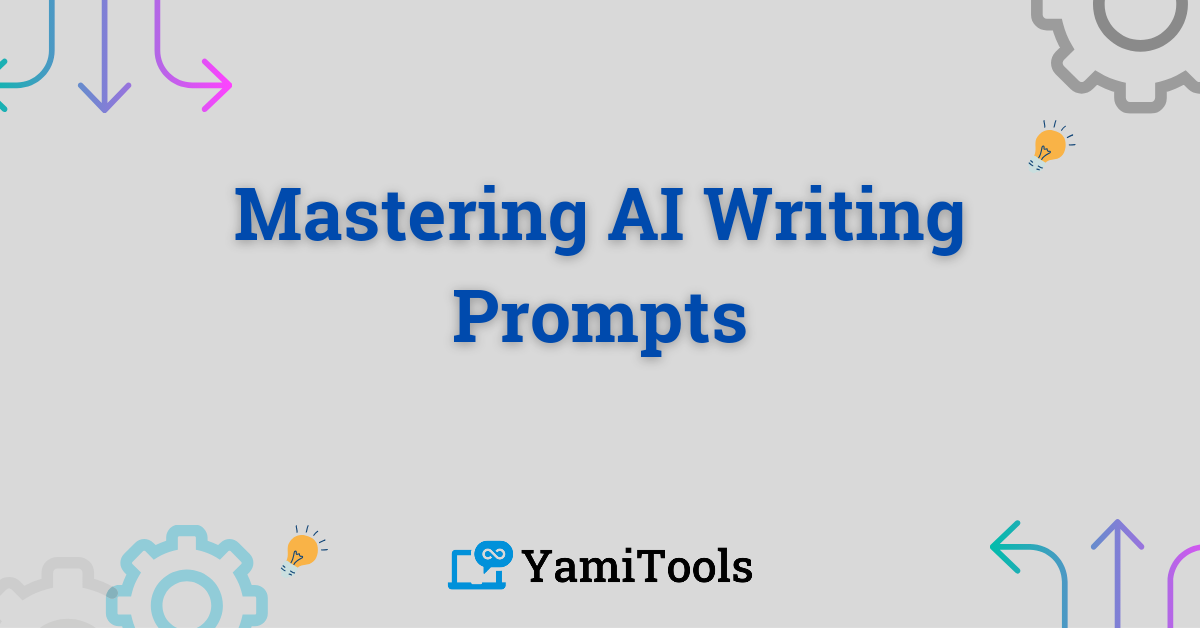Artificial Intelligence (AI) has revolutionized various sectors, with one of the most impactful being the realm of content creation. AI writing tools, powered by sophisticated language models like GPT-4, have become indispensable for writers, marketers, and businesses. These tools can generate articles, blogs, marketing copy, and even creative stories with remarkable proficiency. However, the effectiveness of these AI-generated texts heavily depends on the quality of the prompts provided. In this comprehensive guide, we will delve into the art of mastering AI writing prompts, ensuring you harness the full potential of AI for your content needs.
Understanding AI Writing Prompts
What is an AI Writing Prompt?
An AI writing prompt is an instruction or a set of instructions given to an AI writing tool to generate content. These prompts can range from a single word or phrase to detailed descriptions and contextual guidelines. The key to a successful AI-generated text lies in the clarity and specificity of the prompt.
Why Are Prompts Important?
Prompts serve as the foundation for AI-generated content. A well-crafted prompt directs the AI, setting the tone, style, and scope of the output. Poorly constructed prompts can lead to irrelevant, incoherent, or off-topic content. Therefore, mastering the art of writing prompts is crucial for achieving the desired results.
Crafting Effective AI Writing Prompts
1. Clarity and Specificity
The first rule of crafting effective prompts is clarity. The more specific and clear your instructions are, the better the AI can understand and deliver. Instead of vague prompts like “write about marketing,” specify the type of marketing, target audience, and purpose, e.g., “Write a blog post about digital marketing strategies for small businesses focusing on social media platforms.”
2. Contextual Guidance
Providing context helps the AI generate relevant content. Include background information, desired tone, and any specific points you want to be covered. For instance, “Create a professional yet engaging blog post on the benefits of remote work, highlighting productivity and work-life balance.”
3. Length and Format Specifications
Indicate the desired length and format of the content. This can be in terms of word count, structure (e.g., introduction, body, conclusion), or format (e.g., listicle, how-to guide). For example, “Generate a 500-word listicle on the top 10 productivity apps for remote workers.”
4. Tone and Style
Specify the tone and style to align with your brand or audience. Whether you want a formal, academic tone or a casual, conversational style, mentioning this in your prompt will guide the AI. For example, “Write a friendly and informal blog post on the best hiking trails in California.”
5. Keywords and SEO
For SEO purposes, include keywords you want the AI to incorporate. This ensures the content is optimized for search engines, enhancing its visibility. For example, “Write an SEO-optimized article on vegan recipes, including keywords like ‘easy vegan recipes,’ ‘plant-based diet,’ and ‘healthy vegan meals.'”
Examples of Effective AI Writing Prompts
Example 1: Blog Post
Prompt: “Write a 1000-word blog post on sustainable fashion, discussing its importance, current trends, and how consumers can make eco-friendly choices. The tone should be informative yet engaging, appealing to environmentally conscious readers.”
Example 2: Marketing Copy
Prompt: “Create a 200-word promotional email for a new line of organic skincare products. Highlight the natural ingredients, benefits for sensitive skin, and a limited-time discount offer. The tone should be persuasive and friendly.”
Example 3: Creative Story
Prompt: “Write a 500-word short story set in a dystopian future where climate change has drastically altered the planet. Focus on the journey of a young protagonist searching for a legendary sanctuary. The tone should be dark and suspenseful.”
Tips for Mastering AI Writing Prompts
1. Experiment and Iterate
Creating effective prompts often involves experimentation. Try different approaches and refine your prompts based on the outputs you receive. Iteration is key to finding what works best for your needs.
2. Use Examples
Providing examples of desired outputs can guide the AI more effectively. Include snippets or references to similar content that align with your expectations.
3. Be Open to Surprises
While specificity is important, leaving some room for the AI to interpret can lead to creative and unexpected results. Strike a balance between detailed instructions and creative freedom.
4. Provide Feedback
Many AI tools allow you to provide feedback on generated content. Use this feature to fine-tune the AI’s understanding and improve future outputs.
5. Leverage Advanced Features
Explore advanced features offered by AI tools, such as adjusting the creativity level, specifying the source of information, or setting the audience type. These features can enhance the relevance and quality of the generated content.
Common Mistakes to Avoid
1. Vague Prompts
Avoid vague or overly broad prompts. These can result in generic or off-topic content. Instead of “Write about technology,” specify, “Write a 700-word article on the impact of artificial intelligence on healthcare, focusing on diagnostic tools.”
2. Overloading with Information
While context is important, overloading the prompt with too much information can confuse the AI. Stick to the essential details and structure your prompt logically.
3. Ignoring AI Limitations
Understand that AI has limitations. It might not grasp highly nuanced topics or produce content with deep expertise. Use AI as a tool to assist, not replace, human creativity and knowledge.
Conclusion
Mastering AI writing prompts is an essential skill for anyone looking to leverage AI for content creation. By crafting clear, specific, and context-rich prompts, you can guide the AI to generate high-quality, relevant, and engaging content. Remember to experiment, iterate, and refine your prompts, and be mindful of the common mistakes to avoid. With practice and careful attention to detail, you can unlock the full potential of AI in your writing endeavors. Whether you’re a blogger, marketer, or business owner, effective AI writing prompts can significantly enhance your productivity and content quality, paving the way for innovative and impactful communication.







